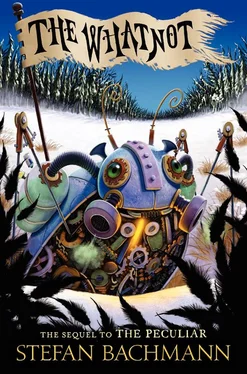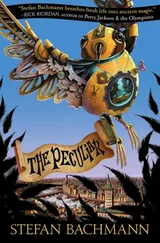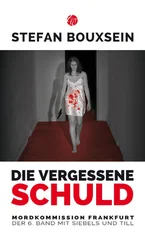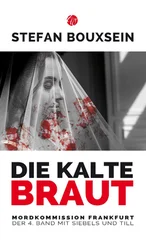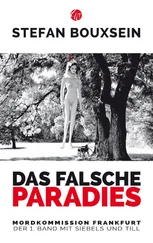For a moment Pikey was looking into two places at once and his brain practically screamed with the effort. London was on one side, cold and dark and swarming with people like so many shadow ants. But on the other side was a different place, a great, dead forest rising out of the snow. He couldn’t hear anything of that world. He still heard London, though. Shouts. The clatter of a gas trolley. The gang leader cursing, backing away.
“Faery-touched,” said the boy in the brass-button coat. “Faery-touched, is this one! ”
Now people were paying attention. Pikey whirled, saw folks slowing their steps, staring, a veiled woman in black bombazine, one gloved hand clapped over her mouth. The whispers spread, fanning out around him. From the corner of his good eye, Pikey saw men slipping toward the spiderweb of streets that went off St. Paul’s Church Yard, to the entrance of Fleet Street where the leadfaces stood. Somewhere not far away, a bell began to ring.
Pikey pushed his fist into his clouded eye. Not again, he thought. Not twice in one day. And then he ran, smashing between the people, toward the widest street he could see. Four leadfaces marched quickly past him in the opposite direction, toward the yells and the growing panic. Pikey had lost his patch, left it behind in the hand of the boy in the brass-button coat, but he didn’t care. Not then. He put his head down and ran as fast and as hard as he could.
He ran until his breath rattled inside his rib-cage. He ran until his muscles burned and his legs felt like bags of water. And when he finally raised his eyes from the cobbles, he found himself in a part of London he had never seen before.
He had gone in entirely the wrong direction. He must be miles from Spitalfields now, miles from the chemist’s shop. Night was falling. The streets were emptying of the regular people, filling with the irregular, the debauched, the drunk, the gaudily dressed fops and hoop-skirted ladies painted up so heavily they resembled nightmarish clowns. Overhead, the streetlamps cast dim reddish halos. The flame faeries that had been inside the lamps before the Ban had been replaced by brimstone bulbs, and these produced an ugly, bloody-looking light, but at least there was no more knocking and spitting, no more glowing faery faces trying to get the attention of the people below. Pikey was glad for it.
Stupid faeries. It served them right they had been sent away. He remembered how, a long time ago, Spitalfields had been swarming with them—faeries with spines, faeries with inky eyes and onion-white skin, with heads of barnacles and thorns, and so many fingers. You couldn’t go anywhere without seeing one, and Pikey had lost count of all the times he had woken in his hole under the chemist’s shop with his bootlaces knotted together, or with nettles wound into his hair. Well, now the faeries were being kicked out, and he hoped they all landed in bramble patches.
He continued to hurry, peering at everyone and wiping his nose. The pubs were bursting with light and riotous war songs. Some ways up ahead a door opened and a great fist punched out holding a filthy jabbering fool by the collar and depositing him in the green-tinged ice of a gutter. Closer, a street circus was setting up its hoops and props. An organ-grinder was playing a jangling, off-key tune. Pikey spotted a lady pulling a miniature hot-air balloon beside her, its basket filled with opera glasses and a fan and other necessaries. He saw someone wearing a pair of newfangled shoes, built of clockwork and powered by coal, that lifted your feet so that you didn’t have to lift them yourself. The man who wore them was galumphing about like a two-ton elephant, and Pikey was careful to give him a wide berth.
He slowed to a walk, fishing in his pocket for the bread. His hand had dropped from his clouded eye, but he didn’t care. He doubted he would be the first person noticed here. The streets were becoming wider. The crowds dwindled away and all went very quiet, the air somehow heavy, as if all the snow that was waiting to fall was pressing down on it, compacting it over the city. Only the occasional steam coach passed by now. Pikey looked up at the soaring stone buildings, with their spires and gables and wrought iron anti-faery gates.
He rounded a corner. He didn’t know where he was, but it must have been a rich place. The houses here seemed absolutely bursting with light. It was almost as if there were no floors or walls inside them and they were simply great hollow shells, little suns burning within.
Traffic had picked up again. Well-bundled ladies and gentlemen were coming up the street, canes swinging, gowns whispering beneath heavy furs. Steam coaches and mechanical horse-and-fours rattled past, leaving swaths of coal smoke behind them. All were headed to the same destination—a great palace of a house, four floors and a green metal roof, and all of its windows, all the way to the roof, lit, punching golden holes in the night.
Pikey approached the house, gnawing at his bread. He watched from behind a lamppost as a great fat lady went up the steps to the door. She wore a delicate hat shaped like a fly and was practically dripping with diamonds. But she didn’t look happy. In fact, she looked downright peeved. Pikey wondered how anyone could be peeved when they had so many diamonds. And going into such a bright, warm house. …
“Ah, the Wyndhammer War Ball,” said a droopy, tucked-up gentleman, passing close by the lamppost. A very tall lady walked at his side, and he was hurrying to keep up. “What a dashing good bash this will be, don’t you think, dear? Don’t you?”
After a while, Pikey spotted the telltale red-and-blue of a leadface and slipped behind a coach wheel, walking along with it as it rumbled over the cobbles. The coach wheel was taller than he was and hid him right to the top of his head. The leadface marched past. As soon as he was gone, Pikey hurried back to the huge house and swung over the iron railing, onto the steps that went down to the servants’ entrance. He didn’t want to leave yet. It was getting colder, but the lights from the windows were so cheery. They shone down onto his face and he imagined he could almost feel their warmth. The panes were fogged right over it was so hot inside.
He sat down on the fourth step from the top and bit away at his bread. It was hard as a rock and full of gritty kernels that probably weren’t flour. Pikey liked it quite a lot. The last carriage left. Faintly the sound of an orchestra drifted into the street. He heard muffled laughter and loud, happy voices.
And then he heard a different sound from the shadows at the bottom of the stairs. A scuttling, scraping noise, like knives dragging swiftly over stone. He sat up.
Was it a rat? The windows of the servants’ hall were dark. No doubt everyone was in the kitchens, wiping and boiling and building towering platters of pork chops and hothouse fruits.
A steam coach turned onto the street, headlamps blazing. The light sliced through the railings, sending spokes of shadow spinning along the wall. In the blackness at the bottom of the steps, a pair of eyes glimmered. Two huge silver globes, there for a second, then gone.
Faery.
Pikey scooted up one step, muscles tense, ready to run. The noise came again, the sharp flutter, and this time it was accompanied by a weeping, thin and high, like a child crying.
Another steam coach coughed and sputtered up the street. The two globes lit again as the headlamps passed, then vanished into the dark. Whatever was at the bottom of the steps began to move.
It approached slowly, painfully, a pale slender thing dragging heavy black wings behind it like a cloak.
Pikey’s heart skipped a beat. That weren’t no cobble spryte.
Читать дальше
